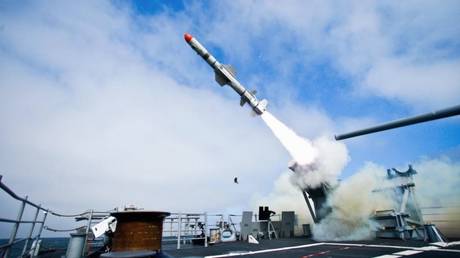
American lawmakers have complained about $19 billion in “backlogged” arms deals to Taipei
Taiwan is set to purchase hundreds of Harpoon anti-ship missiles in a deal approved by the US government, according to Bloomberg. Reports of the upcoming sale came soon after a top US lawmaker met with the island’s leader and declared the need to accelerate weapons sales.
Taipei will soon buy up to 400 missiles for the land-based version of the Harpoon system, the president of the US-Taiwan Business Council, Rupert Hammond-Chambers, told Bloomberg on Monday.
While the Pentagon announced a $1.7 billion Boeing contract for 400 Harpoons on April 7, it did not specify the buyer. However, three other sources familiar with the deal, including an industry official, confirmed the sale is for Taiwan.
A separate contract for 100 Harpoon Coastal Defense Launch Systems was outlined by the Defense Department last year. In that case, the Pentagon did name Taipei as the recipient. Both deals are in line with an initial US government announcement for the Harpoon sale announced back in 2020, which included 100 launchers and 400 missiles, with the full transaction valued at more than $2.3 billion at the time.
Army Lieutenant Colonel Martin Meiners, a Pentagon spokesman, declined to confirm whether the April 7 Boeing contract is intended for Taiwan, but told Bloomberg “we will continue to work with industry to provide Taiwan defense equipment in a timely manner.”
“The United States’ provision to Taiwan of defense articles… is essential for Taiwan’s security,” he added.
Some US lawmakers have clamored to boost arms deals with the island. While leading a congressional delegation to Taiwan earlier this month, Republican Rep. Michael McCaul lamented a “backlog” of weapons sales to Taiwan worth some $19 billion, telling Taiwanese leader Tsai Ing-wen “we are doing everything we can in Congress to speed up these sales and get you the weapons you need.”
Tsai also recently traveled to the United States to meet with US House Speaker Kevin McCarthy, who reiterated vocal support for Taiwan and stressed the need to expedite military support for the island.
Beijing, which considers Taiwan part of its sovereign territory, is unlikely to accept the reported missile sale, having condemned prior US arms transfers to Taipei. Following Tsai’s meeting with McCarthy – the most senior official to meet with her on US soil in decades – the Chinese military responded with three days of large-scale drills simulating the total encirclement of Taiwan, saying the exercises were meant as a “serious warning” for “independence separatist forces” on the island and their foreign backers.
While Washington has long maintained a policy of “strategic ambiguity” toward Taiwan – purposely leaving it unclear whether it would defend Taipei in the event of an attack – President Joe Biden has repeatedly stated that US forces would, in fact, come to Taiwan’s aid. Administration officials have walked back some of those comments, however, insisting that US policy has not changed.




